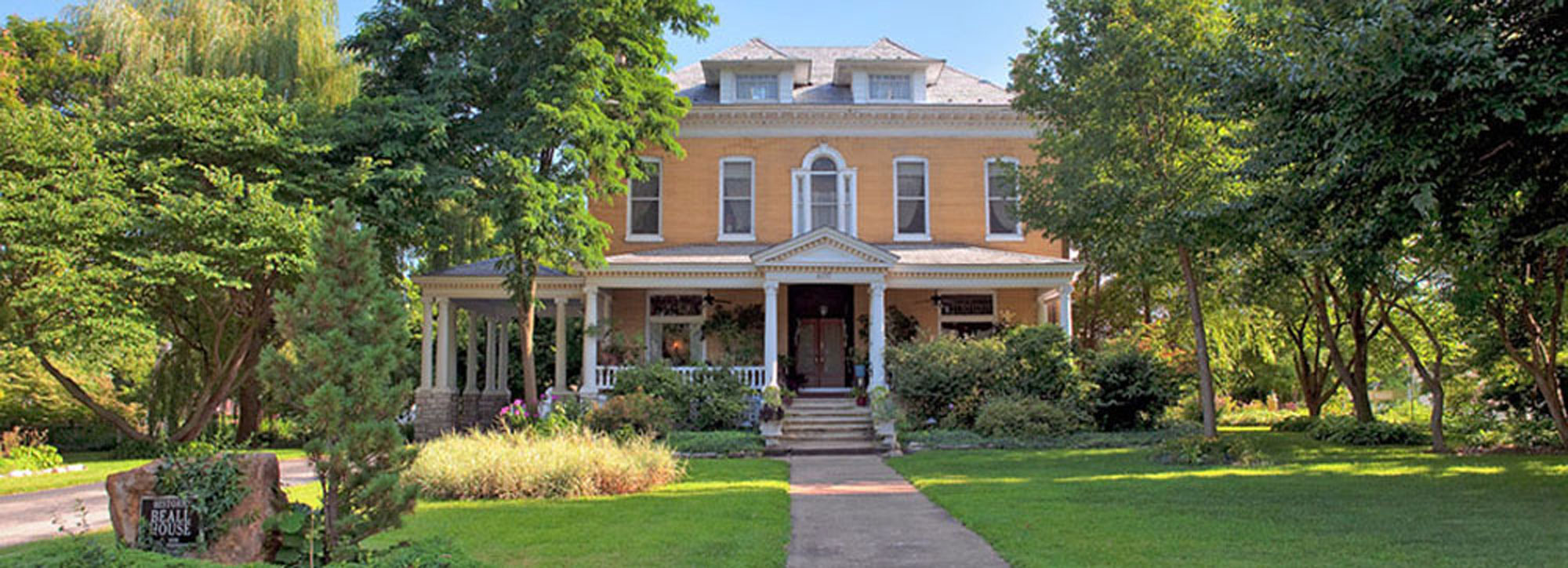407 E. 12th St, Alton, IL 62002 | (St. Louis, MO Area)
(618) 474-9100 or 1-866-The-BEALL

© Cheryl Elchar Jett
Lucas Pfeiffenberger designed dozens of mansions and public buildings in Alton, Illinois, and became a community leader during the late 1800s and early 1900s.
The son of German immigrants who realized the value of education, Lucas Pfeiffenberger was born November 14, 1834, and grew up in Dayton, Ohio, and was given an excellent education, learning engineering and architecture. After gold was discovered in California, he traveled there to spend time in the gold fields. He returned to Ohio to visit his family, but was soon eager to make another trip to California. Along the way, he stopped in Alton, Illinois in 1857 to visit with a former teacher. He was charmed by the river city and decided to stay, soon establishing himself as an architect. His Queen Anne, Italianate, Georgian Revival, and other designs soon graced Alton in the form of magnificent mansions and churches, schools, and other public buildings. In 1867, Pfeiffenberger married Elizabeth C. Mather, daughter of an Alton pioneer family. The marriage produced five children, of which two sons later joined him in the architectural firm, Lucas Pfeiffenberger and Sons.
Homes in Alton designed by Pfeiffenberger included those belonging to entrepreneur and horticulturist Henry Guest McPike (1869), steamboat captain G. W. Hill (1870), owner of stone quarries Henry Watson (1879-1881), tobacco magnate John Drummond (1882-1885), Illinois Glass Company engineer Christian Koenig (1887), manufacturer J. W. Beall (1895), wholesale grocer George M. Ryrie (1902), railroad vice president Harry H. Ferguson (1903), riverboat magnate Z. B. Job (later Senator Edmond Beall) (1903), banker J. E. Hayner, insurance and coal businessman E. M. Dorsey, and Pfeiffenberger's own beautiful home on State Street (1868). One of the Beall homes, on East 12th Street, has become a popular bed and breakfast and is known simply as the Beall Mansion. The home of Henry Guest McPike fell into a sad state of disrepair in the twentieth century and was reputed to be haunted. Today its new owners are trying to overcome years of decay and vandalism to the home and offer haunted tours of the McPike Mansion.
Pfeiffenberger designed numerous public buildings in the Alton area as well. The list includes the Alton Women's Home, the Nazareth Home, the Garfield School, the Lincoln School, the Wood River School, St. Mary's Catholic Church, St. Patrick's Church, the first St. Joseph's Hospital building, St. Anthony's Infirmary, and the Madison Hotel. Commercial buildings designed by Pfeiffenberger included the Bowman Dry Goods Store, the Beall Brothers manufacturing plants, Illinois Corrugated Paper Company, part of the Alton Brick Company plant, the First National Bank building, and the Alton National Bank.
Lucas Pfeiffenberger soon became involved in the affairs of his adopted city and devoted many years to public service. The 1891 Portrait and Biographical Record of Madison County, Illinois states that, "Lucas Pfeiffenberger. Few men in Madison County are better known and none more honored than the one whose name stands at the head of this sketch." He served as head of the fire department from 1866 until 1872. In 1872, he was elected the 25th mayor of Alton and served four terms. He helped to organize the Alton Board of Trade and served as its president. He served on numerous boards and helped to establish the Building and Loan Association, serving as its president. He also served as president of the Bluff City Building and Loan Association and later the Piasa Building and Loan Association. Pfeiffenberger's political opinions brought him into the Democratic party, for which he served as a member of the Illinois State Central Committee. He was a member of the Catholic Church.
Pfeiffenberger died in 1918 and was buried in the Alton City Cemetery, leaving his wife and three surviving sons.
